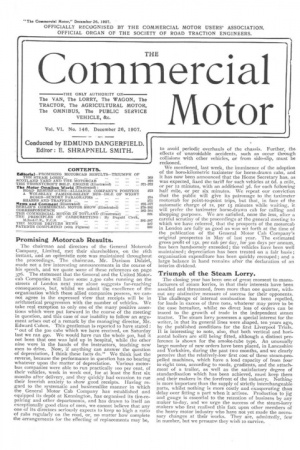Promising Motorcab Results.
Page 1

If you've noticed an error in this article please click here to report it so we can fix it.
The chairman and directors of the General Motorcab Company, Limited, met their shareholders, on the 16th instant, and an optimistic note was maintained throughout the proceedings. The chairman, Mr. Davison Dalziel, made not a few interesting announcements in the course of his speech, and we quote some of these references on page 376. The statement that the General and the United Motorcab Companies will have some 2,500 cabs running on the streets of London next year alone suggests far-reaching consequences, but, whilst we admit the excellence of the organtsation which these allied companies possess, we cannot agree in the expressed view that receipts will be in arithmetical progression with the number of vehicles. We take real exception to only one of the many positive assertions which were put forward in the course of the meeting in question, and this case of our inability to follow an argument arises out of a remark by the managing director, Mr. Edward Cohen. This gentleman is reported to have stated : "out of the 500 cabs which we have received, on Saturday last we ran 490. We would have run the whole soo, had it not been that one was laid up in hospital, while the other nine were in the hands of the instructors, teaching new men to drive. Now, if anything can answer the question of depreciation, I think these facts do." We think just the reverse, because the performance in question has no bearing whatever upon the matter of depreciation. Various motorbus companies were able to run practically too per cent, of their vehicles, week in week out, for at least the first six months after delivery, and they quickly had occasion to rue their feverish anxiety to show good receipts. Having regard to the systematic and businesslike manner in which the General Motor Cab Company has established and equipped its depot at Kennington, has organised its tire-repairing and other departments, and has drawn to itself an exceptionally good class of men, we cannot believe that any one of its directors seriously expects to keep so high a ratio of cabs regularly on the road, or, no matter how complete the arrangements for the effecting of replacements may be,
to avoid periodic overhauls of the chassis. Further, the. effects of unavoidable accidents, such as occur through collisions with other vehicles, or from side-slip, must be reckoned.
We mentioned, last week, the imminence of the adoption of the hero-kilometric taximeter for horse-drawn cabs, and it has now been announced that the Home Secretary has, as was expected, fixed the tariff for such vehicles at 6d. a mile, or per 12 minutes, with an additional 3d. for each following half mile, or per six minutes. We repeat our conviction that the public will give its patronage to the taximeter motorcah for point-to-point trips, but that, in face of the automatic charge of is, per 15 minutes while waiting, it will prefer the taximeter horse-drawn cab for calling and shopping purposes. We are satisfied, none the less, after a careful scrutiny of the proceedings at the general meeting to which we have referred, that the prospects of the motorcab in London are fully as good as was set forth at the time of the publication of the General Motor Cab Company's original prospectus in May of last year. The estimated gross profit of 155. per cab per day, for 300 days per annum, has been handsomely exceeded ; the vehicles have been well maintained ; depreciation has been treated on a fair basis ; organisation expenditure has been quickly recouped ; and a large balance in hand remains after the declaration of an interim dividend.
Triumph of the Steam Lorry.
The closing year has been one of great moment to manufacturers of steam lorries, in that their interests have been assailed and threatened, from more than one quarter, without any oistinctive measure of success for their opponents. The challenge of internal combustion has been repelled, for loads in excess of three tons, whatever may prove to be the case hereafter, whilst no direct loss of orders can be traced to the growth of trade in the independent steam tractor. The steam lorry possesses a special interest for the writer, in that its general lines were shaped, ten years ago, by the published oonditions for the first Liverpool Trials. It is interesting to note, also, that both vertical and horizontal boilers are still being fitted, although a distinct preference is shown for the smoke-tube type. An unusually large number of new orders have been placed, in Lancashire and Yorkshire, during the past two months, and. we clearly perceive that the relatively-low first cost of these steam-propelled machines, which have a load capacity of from four to eight tons, according to roads, gradients, and the attachment of a trailer, as well as the satisfactory degree of standardisation which has been achieved, must keep them and their makers in the forefront of the industry. Nothing is more important than the supply of strictly interchangeable parts, whilst nothing is more costly and exasperating than delay over fitting a part when it arrives. Production to jig and gauge is essential to the retention of business by any maker to-day, and we urge the success of the steam-lorry makers who first realised this fact upon other members of the heavy motor industry who have not yet made the necessary changes at their works. They are, admittedly, few in number, but we presume they wish to survive.






















